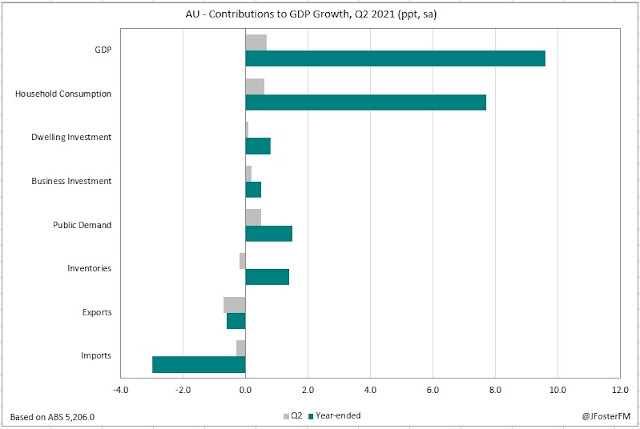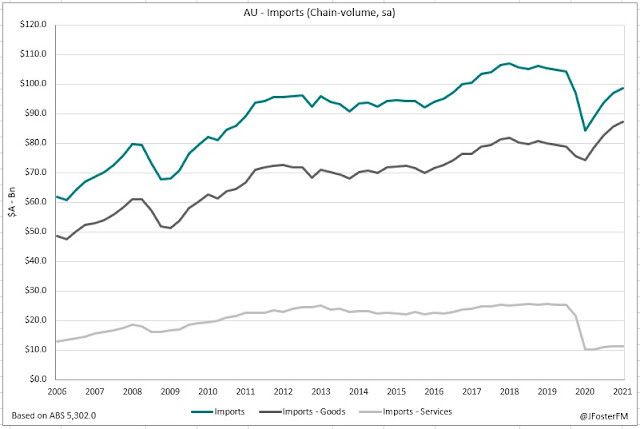Australia's economy expanded at a faster than expected pace in the June quarter rising by 0.7% against the market median of 0.4%. Growth in annual terms surged from 1.3% to 9.6% as last year's historic contraction of -7% during the depths of the national lockdown fell out of the calculation.
Ahead of the setback to come from the emergence of the Delta variant and associated lockdowns, momentum in the Australian economy was strong with output in the June quarter rising to be 1.6% above its pre-pandemic level. However, the international border restrictions and its impact on population growth meant GDP was still tracking below its forecast trajectory from February 2020, based on RBA forecasts.
Household consumption remained robust in the quarter (1.1%), contributing 0.6ppt to growth. The ongoing rotation in spending patterns broadened, with services up 1.3% to growth of 0.9% in goods. Meanwhile, discretionary spending advanced by 1.6% as essentials lifted by 0.9%. Household consumption was almost back to end 2019 levels, while the profile of spending was returning to its pre-pandemic shares, though Delta has disrupted that. The rise in spending was funded by a draw down in the saving ratio in Q2, from 11.6% to 9.7%, as real disposable income was lower over the period (-1.0%).
Private investment continued to advance, with residential construction (1.7%q/q) coming in better than partial indicators had suggested and business investment expanding further (2.3%q/q), with equipment spending a key contributor in response to tax incentives.
Public demand saw another robust showing, lifting 1.9%q/q with state and territory governments bringing forward projects to provide stimulus to local recoveries.
Inventories were a key surprise, subtracting only 0.2ppt from growth in Q2 against an expected -0.7ppt. Builds on public (0.35ppt) and farm inventories (0.15ppt) moderated the overall drag on growth.
Net exports were in line with expectations, taking away 1.0ppt from quarterly activity. Exports contracted by 3.2%, weighed by disruptions in the resources sector (-5.9%). Imports continued to lift (1.5%) on robust domestic demand.
Other key highlights from the quarter included a surge in national income, with nominal GDP lifting another 3.2% to be nearly 8% higher than prior to COVID. Elevated commodity prices drove the terms of trade to a record high level, generating strong tailwinds for company profits and government revenues.
Meanwhile, hours worked continued to rebound on eased restrictions and vibrant trading conditions, rising by 1.9%q/q across the economy and by 2.3%q/q in the market sector. Hours worked were approaching pre-pandemic levels but have been disrupted significantly in Q3.
Link to full review here






















































